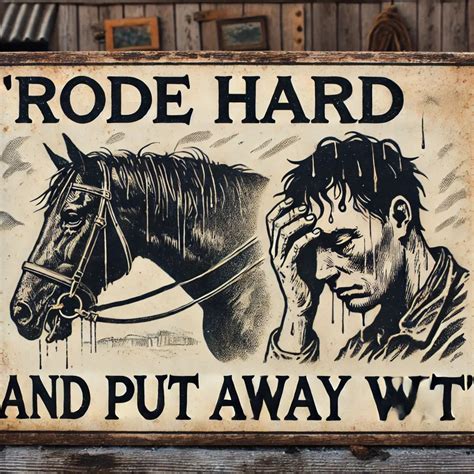Introduction

The phrase “ridden hard and put away wet” is a figurative expression that evokes a range of interpretations. Often associated with reckless behavior and negative consequences, it serves as a cautionary tale about the perils of overindulgence and the importance of self-care. In this article, we delve into the multifaceted meanings of this phrase, exploring its historical origins, societal implications, and potential applications to modern-day life.
Historical Origins
The phrase “ridden hard and put away wet” traces its roots to the equestrian world. In the 19th century, horses were essential for transportation and warfare. Cavalrymen often rode their horses relentlessly, pushing them to their physical limits. However, after such strenuous exertion, it was considered essential to properly care for the horses by drying them off and providing them with rest and nourishment. Failure to do so could lead to health problems and premature aging for the animals.
Societal Implications
Over time, the phrase “ridden hard and put away wet” extended beyond its equestrian origins and became a metaphor for human behavior. It came to represent the idea of exploiting resources or individuals without regard for their well-being. In a society that prioritizes productivity and consumption, this phrase serves as a warning against the dangers of burnout, exhaustion, and neglecting self-care.
Consequences of Neglect
When applied to human relationships, “ridden hard and put away wet” suggests a pattern of exploitation and disregard. Individuals who are consistently taken advantage of, emotionally or physically, may feel used and neglected. This can lead to feelings of resentment, low self-esteem, and impaired mental health. Similarly, in the workplace, employees who are overworked and underappreciated may experience stress, exhaustion, and decreased job satisfaction.
Self-Care and Resilience
The antidote to the negative consequences of being “ridden hard and put away wet” is self-care. This involves prioritizing one’s own well-being through practices such as:
- Establishing healthy boundaries
- Engaging in regular exercise and physical activity
- Getting enough sleep
- Maintaining a balanced diet
- Practicing mindfulness and meditation
- Seeking support from friends, family, or professionals when needed
By investing in self-care, individuals can build resilience and avoid the detrimental effects of burnout and exhaustion.
Applications to Modern Life
The phrase “ridden hard and put away wet” holds relevance in various aspects of modern life, including:
- Environmental Sustainability: Thoughtless consumption of natural resources without proper care for the environment can be likened to riding hard and putting away wet.
- Work-Life Balance: Failing to maintain a healthy balance between professional and personal life can lead to chronic stress and burnout.
- Relationships: Exploitative or neglectful relationships can take a toll on mental and emotional well-being.
- Technology Addiction: Excessive use of technology without considering its potential negative effects can be a form of riding hard and putting away wet.
Conclusion
The phrase “ridden hard and put away wet” serves as a poignant reminder of the importance of balance, self-care, and sustainability. By recognizing the consequences of neglect and embracing a proactive approach to well-being, individuals and society as a whole can thrive in the face of adversity. The wisdom embedded in this expression remains as relevant today as it was centuries ago, guiding us to live healthier, more fulfilling lives.
